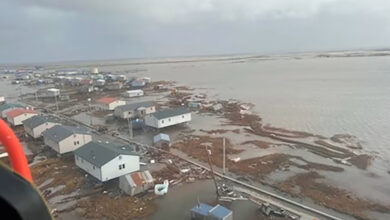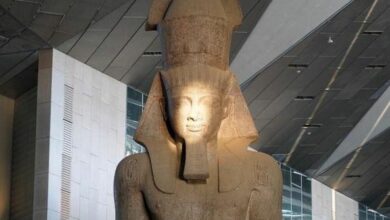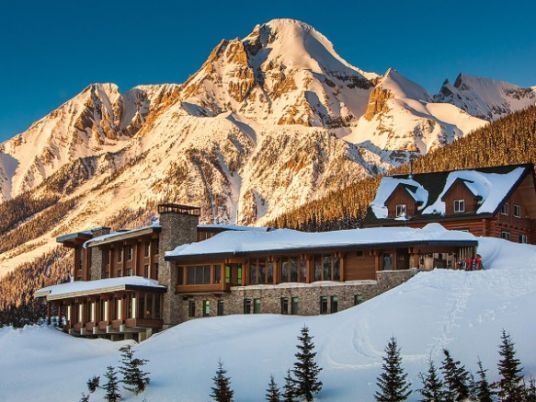
Whop, whop, whop, whop.
The thump of the rotors fades as the helicopter lifts away.
Silence, just for a moment — a chance to drink in the pristine peaks.
Then the rush of excited chatter as skis or snowboard are clicked on and the group turns to listen to the guide.
Hearts beat faster, like the noise of the aircraft that brought you here.
Now it's time to plunge into paradise …
Heli-skiing is the ultimate challenge for the powder-hungry skier or boarder in the never-ending quest to carve tracks in soft snow.
Leaving the lifts and crowds far behind, it takes winter sports to a higher plane.
Like all of life's luxuries it doesn't come cheap — and bad-weather days are an occupational hazard.
But if powder is the priority, there's a heli adventure out there for everyone from decent intermediates to movie-making hotshots.
As legendary ski film maker Warren Miller puts it: "If you don't go this year, you will be one year older when you do."
Alaska — Chugach Range
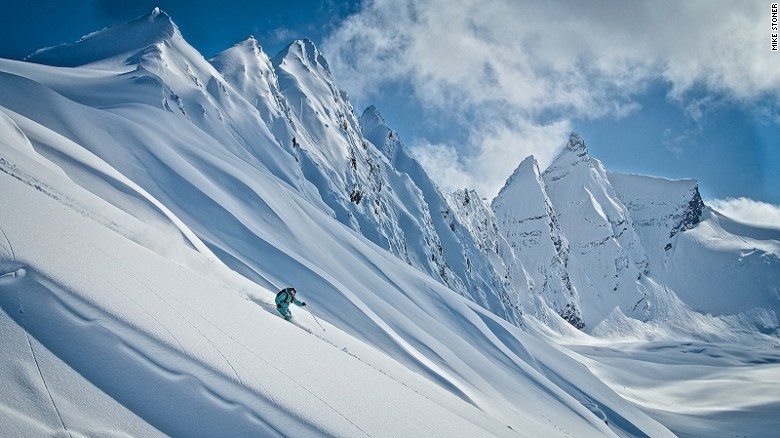
The Chugach Mountains surrounding Valdez receive an annual average of nearly 700 inches of snow. Near the coast, the snow is moist, so more stable on steep slopes.
Why: The authentic Alaska experience, and the setting for so many extreme ski movies.
Big mountains, big lines, steep and deep.
The Chugach Mountains surrounding Valdez receive an annual average of nearly 700 inches (17.7 meters) of snow.
Being near the coast means the snow is moist and therefore more stable on steep slopes.
Valdez Heli-Ski Guides specialize in big mountains and small groups, with four guests per ship accessing Alaska's famed spines, couloirs and iconic terrain.
Its benchmark Eurocopter A-Star B2 helicopter delivers passengers atop leg-jellying runs averaging 3,000 to 5,000 vertical feet (914 to 1,524 meters).
Afterward, the Tsaina Lodge offers gourmet dining with views over Washington Glacier. Seven-day packages start at $10,806.
Who: Big-name extreme skier Dean Cummings' H20 Guides are based in Valdez, while Chugach Powder Guides operate out of Girdwood in the western Chugach.
Alaska — Tordrillo
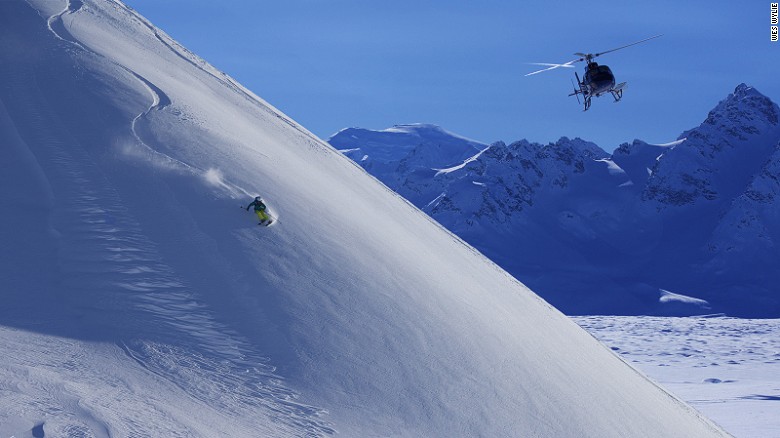
The Alaska Range is home to Denali, North America's highest mountain.
Why: Epic terrain, Denali views, stable weather, wilderness lodge.
From Anchorage, a short float plane hop to Judd Lake reaches Tordrillo Mountain Lodge, a luxury retreat featuring two separate wilderness lodges, co-owned by 1994 Olympic downhill skiing champion Tommy Moe.
Tommy's taxis fly people into 1.2 million acres of heli heaven in the shadow of North America's highest peak, Denali (Mount McKinley), at 20,310 feet.
The heavily glaciated Alaska Range is on a grand scale and offers endless terrain options to keep skiers challenged, with runs that top out at 7,500 feet and more stable weather than other Alaskan spots.
Who: Tordrillo Mountain Lodge offers seven days heli-skiing with five hours flying from $13,000.
British Columbia — Bella Coola
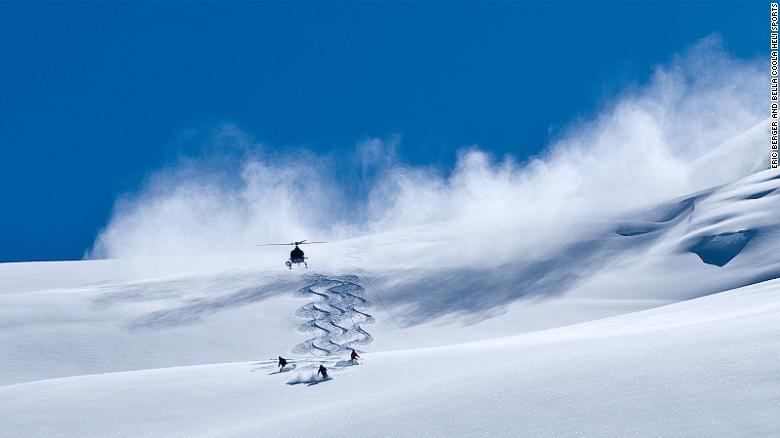
Bella Coola Heli Sports has access to a blade-busting 2.64 million acres of prime Pacific powder.
Why: Fluffy snow, spiritual setting, heli holy land.
This place is home to the First Nation community of Nuxalk people in the Coast Range of British Columbia, and is a gateway to nirvana for skiers and boarders.
Bella Coola Heli Sports has access to a blade-busting 2.64 million acres of prime Pacific powder — light and dry in the mellower east, more stable for steep skiing in the west.
That's 325 times the size of Whistler-Blackcomb, 90 times the size of France's vast Trois Vallees and, heck, bigger than the Swiss Alps.
And with only 36 guests between three luxury lodges — Tweedsmuir Park Lodge features in TripAdvisor's Top 25 Small Hotels (Canada) — you'll never owe anyone a beer by crossing their tracks.
There's so much terrain — 73,333 acres per person — powder 11s, not powder 8s, are the order of the day.
Or in the summer there's heli-fishing.
Who: Bella Coola Heli Sports' Classic Vertical package offers seven nights and eight possible ski days — guests can heli-ski straight from the airport on arrival and departure days — with 100,000 vertical feet of skiing from $7,834.
British Columbia — Revelstoke
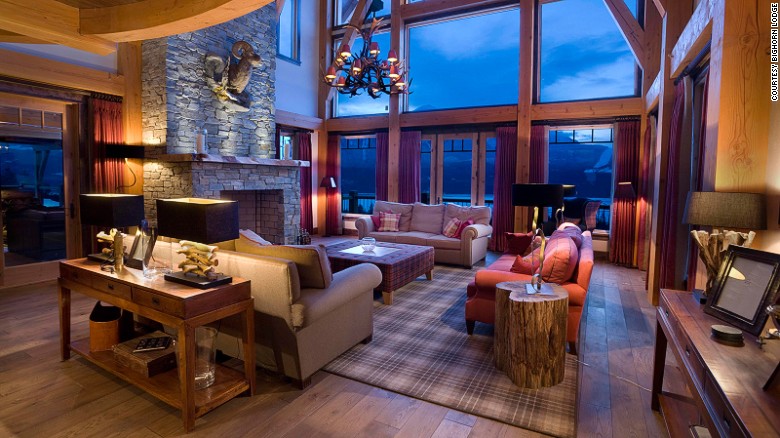
Bighorn Lodge is an ultra-luxe alpine-style chalet for 16 people. It overlooks the Columbia River at the foot of Revelstoke Mountain Resort and has its own helipad.
Why: The epicenter of BC backcountry.
What happens when moist Pacific air meets cold, dry air from the Rockies?
"Revy" cops the mother lode, that's what — 40 to 60 feet a year of powder so light and fluffy it could be used to stuff a comforter.
If that isn't enough, there's Bighorn Lodge.
This ultra-luxe alpine-style chalet for 16 overlooking the Columbia River at the foot of Revelstoke Mountain Resort has its own helipad out front.
Guests can choose from one of three heli operators — Canadian Mountain Holidays, Selkirk-Tangiers, Eagle Pass — and soar up to the Selkirk and Monashee mountain ranges.
They'll need pockets as deep as the snow, but floating down open bowls gulping in white champagne, or whooping and hollering through old growth forests with just three pals and a guide is priceless.
Almost.
Who: Bighorn costs $79,160 for the lodge in a high-season week, excluding heli-skiing. The helicopter will clock up $1,223 per person, per day.
British Columbia — Mica
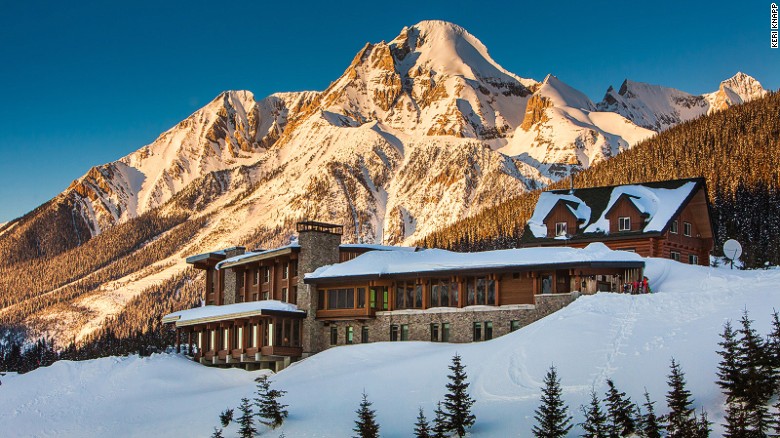
Accessible only by helicopter, Mica Lodge is an elegant eyrie high above the Columbia River, with access to 11 valleys with a variety of terrain.
Why: Powder of the finest kind + a tree-skier's paradise far from the crowds = Mica magic.
Two hours north of Revelstoke, Mica Heli Sports mines a 500-square-mile claim at the convergence of the Rocky, Selkirk and Accessible only by chopper, Mica Lodge is an elegant stay located high above the Columbia River, with access to 11 valleys with a variety of terrain, from steep alpine lines in Tsar Creek to the forests of Molson and Kinbasket Valleys.
Memories of runs called things like Pillow Talk, Mr. Wiggles, Melt Down, High Sweetness and Saddle Soar will sustain skiers for at least a couple of months back at their desks.
Canadian Mountain Holidays, which pioneered BC heli-skiing when Austrian expat Hans Gmoser set up the outfit in 1965, operate their Monashees base a short hop away.
Who: Mica Heli Sports, from $9,658 for seven days; CMH Monashees.
Switzerland — Zermatt
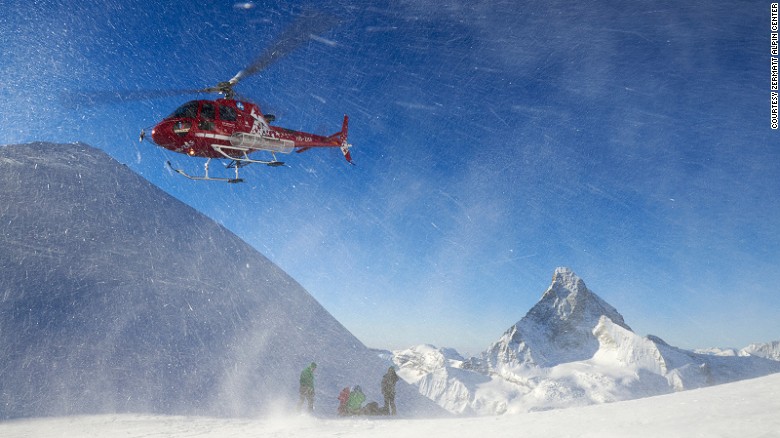
Zermatt is one of Europe's leading winter sports resorts.
Why: Big descents amid alpine giants, majestic Matterhorn views, rich mountain culture.
Heli-skiing in Europe is a slightly different game, more limited by where you can drop than by snow conditions.
Air Zermatt lifts passengers above the roofs of the picturesque old town for a quick buzz of the Matterhorn before settling the skids near the summit of western Europe's second highest mountain, the Monte Rosa (15,200 feet).
Surrounded by other 13,000-foot giants such as the Lyskamm and Breithorn, the vast Gorner Glacier stretches out below 8,200 feet of slopes — via a pit stop at the glimmering aluminum Monte Rosa hut at 9,458 feet.
Other favorite drops are on the Alphubel, the Aeschhorn in the shadow of the mighty Weisshorn or the Testa Grigia on the border with Italy.
Or the chopper can be used as an aerial elevator up the big slogs of the famous Haute Route from Zermatt-Chamonix, saving legs for the many stunning descents.
Who: Air Zermatt charges $394 per person for a drop on Monte Rosa, including the guide's fee.
Japan — Hokkaido
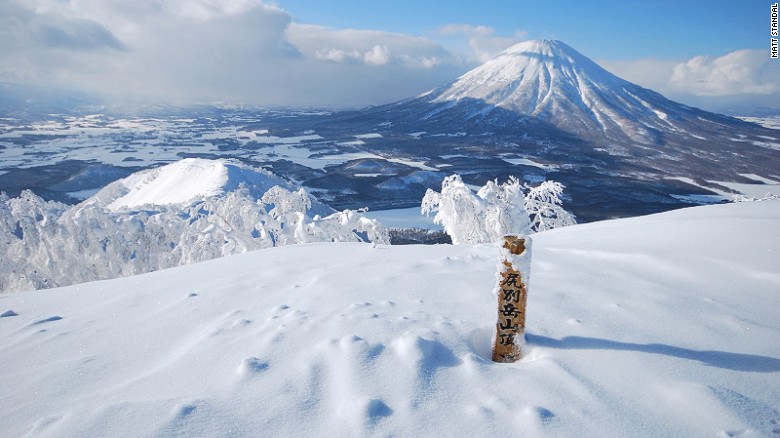
The island of Hokkaido receives up to 60 feet of snow annually. You can ski on dormant volcanoes and through perfectly spaced birch trees.
Why: So Instagrammable. Let's say it with hashtags: #deep #snowfactory #bringyoursnorkel #sushi #sake
Like floating through cold smoke, skiing in Japan is a revelation on and off the hill.
It might be called the Land of the Rising Sun, but in winter Siberian storms dump industrial quantities of snow — the northern island of Hokkaido receives up to 60 feet of snow annually.
A helicopter just increases the options — skiing on dormant volcanoes and through perfectly spaced birch trees in powder so deep that a snorkel would come in handy.
Niseko resort is big into night skiing.
Or visitors can relax in an onsen (hot springs) and contemplate life, powder and sushi.
Who: Hokkaido Backcountry Club runs daily trips to the 3,631 foot Shiribetsu-Dake volcano starting from $852.
New Zealand — Southern Alps
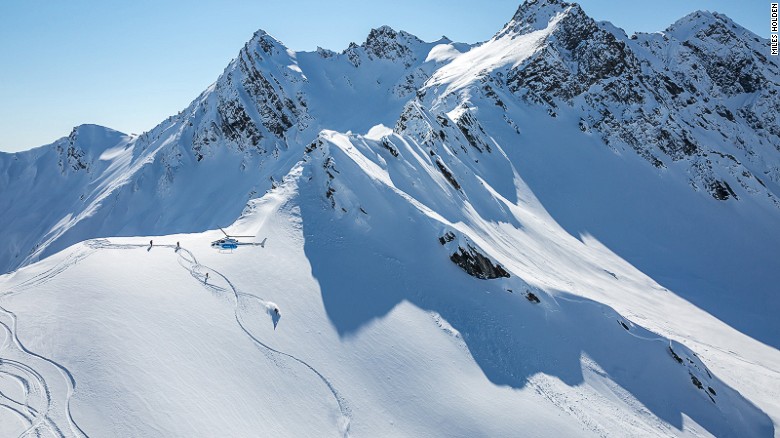
Southern Lakes Heli-Ski operates out of Queenstown and Wanaka from July to September, with access to 3,200 square miles across 11 different mountain ranges, including the Clark Glacier.
Why: For northern hemisphere dwellers seeking an endless winter, and southerners with a sense of adventure.
Southern Lakes Heli-Ski operates out of Queenstown and Wanaka from July to September, with access to 3,200 square miles across 11 different mountain ranges, including the Clark Glacier.
Most terrain lies between 3,937 and 8,480 feet, with a typical run from 1,968 to 3,280 feet vertical.
Single-day trips are more the norm in New Zealand but there is something for everyone — from three-run intro trips to the full luxury lodge experience, staying at the Minaret Station wilderness retreat or on board a private yacht moored on Lake Wakatipu.
Who: Southern Lakes Heli-Ski's four-run classic trip costs $653, with extra runs at $72.
India — Himachal Pradesh
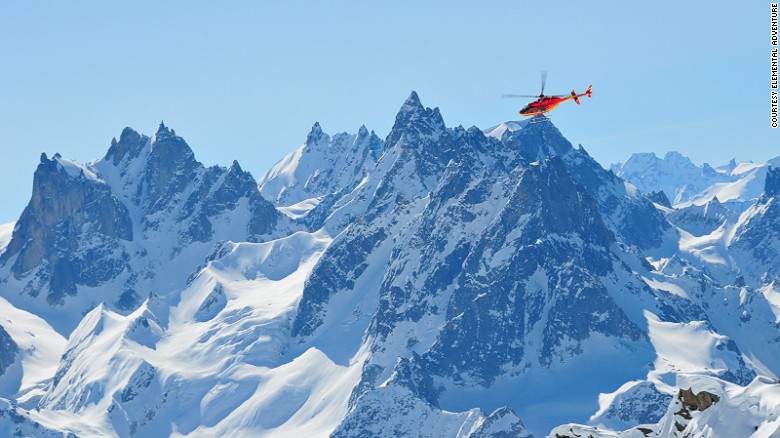
The Himachal Pradesh region has everything on the heli hit list, from skiing steep summits to racing down ridges, and plunging into birch, oak and cedar forests.
Why: Heli fun on a Himalayan scale, with a vibrant valley for downtime.
An hour's flight north of Delhi lies the hill station of Manali, known as the Valley of the Gods.
Then it's up to 16,400 feet for lung-bursting descents among Himalayan giants.
The Himachal Pradesh region has everything on the heli hit list, from skiing steep summits to racing down ridges, and plunging into birch, oak and cedar forests.
The action will, literally, take any skier's breath away, if the vast views of nearby 21,325 foot peaks haven't already.
Off the hill, the exotic Kullu Valley and its stimulating culture excite the senses as much as the skiing.
Who: Elemental Adventure's Himalayan Odyssey package offers six days' heli-skiing including 100,000 vertical feet from $7,607.
Russia — Kamchatka
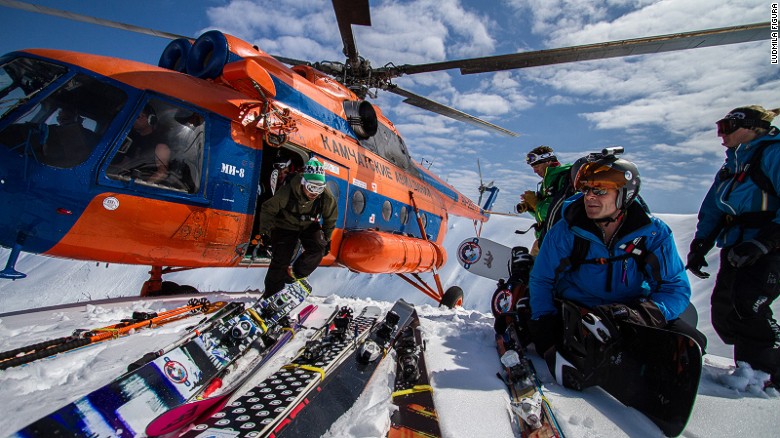
The vast Kamchatka Peninsula is home to 200 volcanoes — 29 are active. Here you can helicopter up to smoking summits then hurtle down volcanic faces, couloirs, open bowls and tree runs.
Why: Untamed, raw, wild and like nowhere anyone has skied before.
Burning thigh muscles might not be the only thing on fire in this remote wilderness.
The vast Kamchatka Peninsula in the far east of Russia between the Sea of Okhotsk and the Bering Sea is home to 200 volcanoes — 29 of which are active.
But geomorphology isn't why people come here.
It's to ride big Russian choppers up smoking summits and hurtle down volcanic faces, couloirs, open bowls and tree runs until they end up on the beach.
The capital Petropavlovsk is the base, but the UNESCO World Heritage back-country is the playground.
With a highest landing zone at 11,388 feet, some descents can nudge 9,840 feet.
Who: EA Heli-skiing offers a seven-night Fire and Ice package with eight hours of flying time for $6,628.
Luxury yacht — anywhere
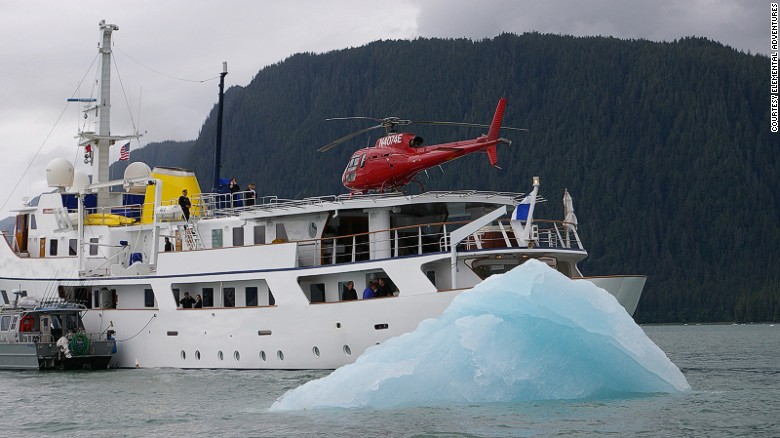
Luxury yachts can simply sail within touching distance of mountains and jump on a helicopter from the deck each morning. Anyone who has to ask how much it costs probably can't afford it.
Why: Why not?
If an off-the-peg heli-skiing trip is too mundane, luxury yacht owners can simply sail within touching distance of mountains and jump on a helicopter from their deck each morning.
The beauty is they can keep moving, sniffing out new spots.
Skippers can deliver the yacht to the inland waterways of Alaska, British Columbia, Chile, Greenland, Iceland, wherever.
Then it's just a matter of flying into the ultimate in ultimate.
Don't have a yacht but like the idea? That can be arranged.
But anyone who has to ask how much it costs probably can't afford it.
Click here for the original story

